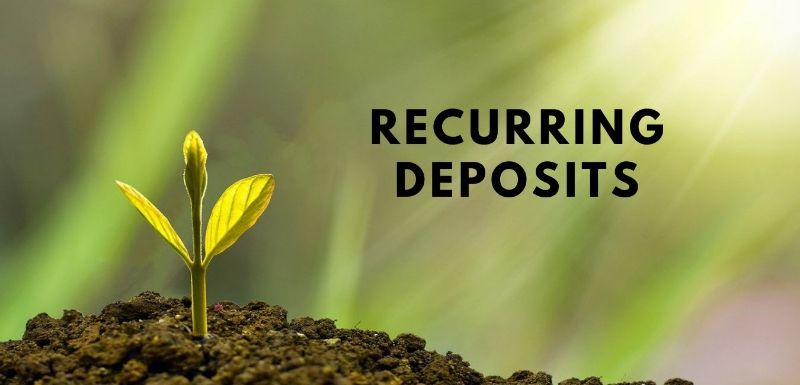Are you thinking about putting your money to work through small, regular investments? If so, recurring deposits might just be your best bet. Let’s dive into how to open a recurring deposit account and discover the advantages it offers.
What Is a Recurring Deposit (RD) Account?
Recurring deposit accounts are like a slow and steady way to grow your money. They let you put aside a fixed amount of cash on a regular basis, usually every month. You can pick how long you want to do this and how much you want to put in each time.
Unlike fixed deposits where you need to dump all your cash at once, RDs let you start with a small amount and add to it over time. The best part? You don’t need to keep thinking about it – your money grows on its own.
RDs vs. Fixed Deposits: Flexibility Wins
RDs are like the flexible cousin of fixed deposits. With fixed deposits, you need to dump all your cash at once. But with RDs, you can start with a small amount and keep adding to it regularly. So, it’s like saving bit by bit and watching it grow.
Interest rates on RDs can range from 2.5% to 7.0%, and you can get started with just Rs. 100 a month. You can keep this up for anywhere from six months to 10 years. Interest gets added up every three months, and while you can’t take out a part of your money whenever you want, you can withdraw the whole thing early – although there might be a penalty.
Different Types Of RD
RDs come in different types to suit your preferences:
1. Regular RD Accounts
Anyone aged 18 and above can jump on this bandwagon. It’s like saving for a rainy day with a twist. You toss in a fixed amount every month for a set time, and it brings you back interest. The longer you save, the more your money grows. Simple, right?
2. RD Accounts for Minors
If you’re not an adult yet, you can still get into the RD game with your parent’s or guardian’s help. Just like the regular RD, you deposit a set amount every month for a specific duration. You might even get better returns than grown-ups.
3. RD Accounts for Senior Citizens
If you’re a senior citizen (above 60), banks roll out the red carpet for you. You might get a sweeter interest rate than others, and it compounds every quarter.
4. NRE/NRO RD Accounts
If you’re a non-resident Indian (NRI), these accounts let you save and earn a decent interest, whether you’re getting money from India or abroad.
Is RD Interest Taxable?
Curious about the tax implications on a recurring deposit? It might come as a surprise, but recurring deposits aren’t exempt from taxes. The interest you earn from them is like income, and you might have to pay tax on it. How much? Well, it depends on the tax slab you’re in. If you earn more than Rs. 10,000 from your RD, the bank deducts a 10% TDS (tax deduction at source). If your annual income is lower than the exemption limit, you can dodge this tax by giving your bank a form called 15G. For the wise senior citizens, form 15H is your ticket to tax relief.
RD Features: Quick Look
RDs work by letting you put in a set amount of cash at regular intervals until your time is up. Once it’s over, you get back the money you put in along with the interest it’s earned. Here’s a quick rundown at it’s features:
Minimum Investment: Starts as low as Rs. 10, depending on the bank.
Deposit Term: You can choose from 6 months to 10 years.
Interest Rate: RDs offer better interest than savings accounts and are similar to fixed deposits.
Benefits of RD Investments
RDs are like the dependable friend of your investment journey. They’re risk-free and guarantee your investment plus interest. Here’s what you get:
1. Financial Goals Made Easy
RDs are like your financial BFF for both short and long-term plans. Whether it’s a home makeover, a fancy vacation, or covering wedding expenses, RDs help you gather the money you need.
2. Saving Discipline
If you’re the kind who needs a nudge to save, RDs have your back. They make you put aside a fixed amount every month. Perfect for those who juggle bills with a steady paycheck.
3. Steady Interest
The best part? RDs don’t care about market trends. Your interest is fixed for the entire tenure. So, no matter what’s happening out there, your returns stay steady.
Final Thoughts
Recurring deposits are like the slow but steady champions of investments. They’re for the disciplined savers, the goal chasers, and anyone who likes knowing exactly what they’re getting. Just remember, like any investment, it’s good to weigh your options and see if an RD fits your financial puzzle. Also, There are also several money management app to keep an eye on your hard-earned money.
Naina Rajgopalan has a thing for numbers and a deep fascination to learn about all things finance. She's been money-wise from a young age and has always shared her knowledge and tips with those around her. Being a part of the content team at Freo Save, a digital savings account that offers up to 7% interest rate on savings along with benefits such as insurance on balance, safe & secure banking, and so on. Naina stays updated with the latest of what happens in the banking and fintech industries. She has taken upon herself to share her knowledge with readers across all walks of life to help them manage their finances and budgets better, so they can make better decisions while spending, borrowing, investing and saving.

